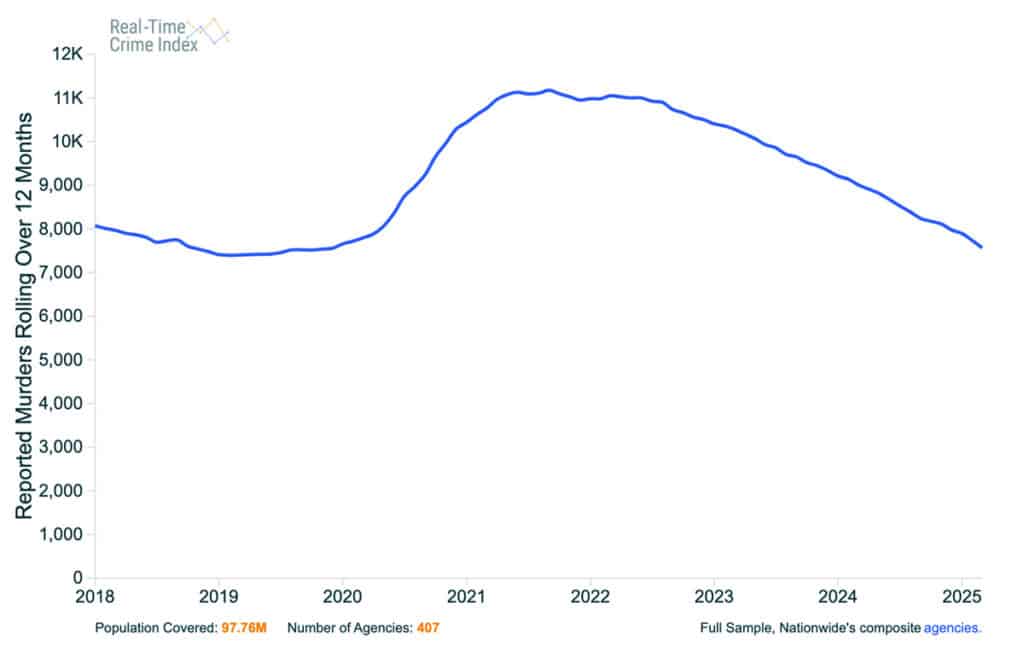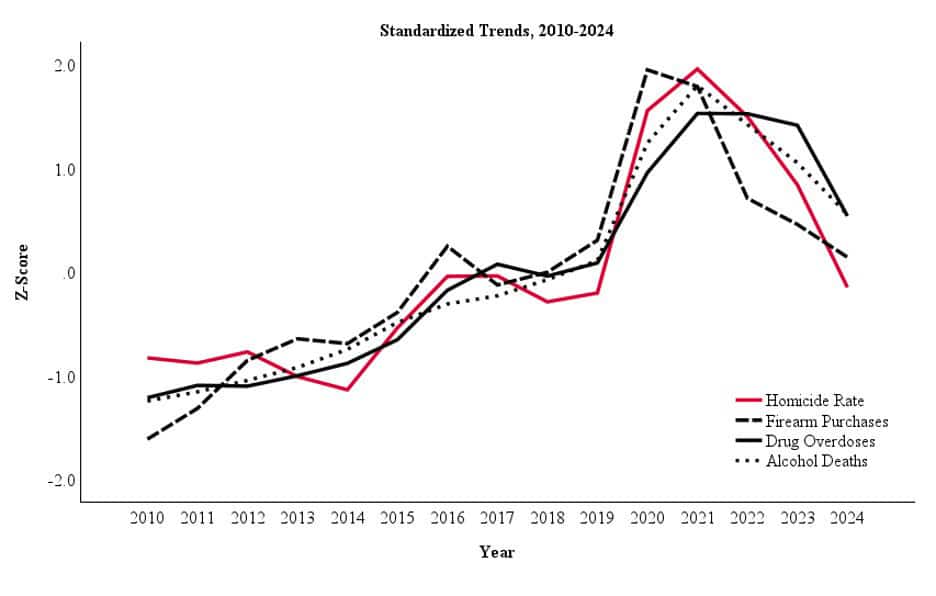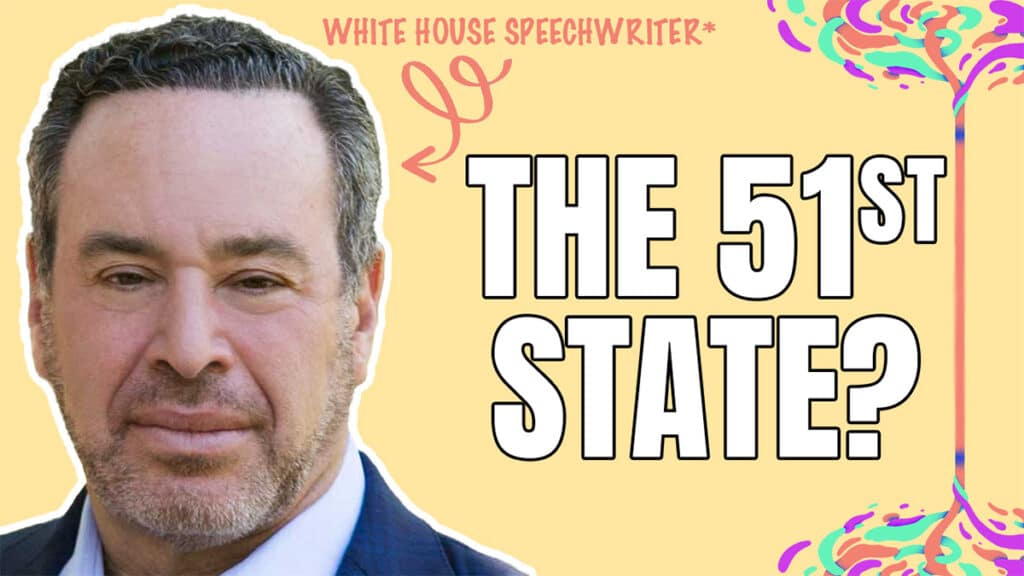Volcanoes are erupting in The Philippines, but on-fire Australia received some welcome rain. The Iran war cries have been called off and The Donald’s military powers are about to be hamstrung by the Senate. Meanwhile, his impeachment trial is starting, and we’re all on Twitter for a front-row seat.
What Could Go Right? 2025’s Big Crime Drop
So far, the year is shaping up to be the most nonviolent in recent memory.
This is our weekly newsletter, What Could Go Right? Sign up here to receive it in your inbox every Thursday at 5am ET. You can read past issues here.
2025’s Big Crime Drop
That the media covers crime’s ascent but not its descent is at this point a truism. It does bring with it a real risk, however—that the bubble of public fear, once it has swelled, will never pop.
Let me pop it for you now. So far, 2025 is shaping up to be the most nonviolent year in recent memory, and in some cases, on record, in the United States. Consider:
1. The first four months of 2025 have seen the lowest count—four—of mass shootings with four or more fatalities since 2006, the year in which data began to be collected in the Mass Killing Database, which is run by the Associated Press, USA Today, and Northeastern University.
Shootings with at least four victims killed or wounded are also down in the first four months of this year, as compared to the same time period last year. And so far in 2025, there have been zero mass shootings that have occurred in public. There were three last year and a record ten in 2023.
2. Various homicide databases show drops in the murder rate of up to ~20 percent in the first quarter of 2025, leading crime analyst Jeff Asher to consider the possibility that this year could feature the lowest murder rate ever recorded since reliable data became available in the 1960s. If current trends continue, the rate would beat 2014’s previous bottom and put us in sync with rates not consistently seen since the 60s. Will it happen? It’s plausible, although a discussion properly informed by data would have to wait until the fall, says Asher.

3. Per Asher’s Real-Time Crime Index, which tracks crime monthly, in addition to murders falling 21.6 percent in the first quarter of 2025, violent crime is down 11 percent and property crime, 13.8 percent.
The big question is why.
Many types of crime surged during the pandemic and then began to fall. This year could simply be a continuation of 2024, which saw a reversal of a rising criminal tide that was propelled by all of the pandemic’s breakages—unemployment, school and social services closures, general stress. Once those factors disappeared, so too did the crime. According to a report by the Council on Criminal Justice, which analyzes data from 40 American cities, by 2024, most violent crime rates had already returned to where they were circa 2019, with sexual assault, domestic violence, and robbery seeing double-digit decreases. (Aggravated and gun assaults were up slightly from 2019, however, and carjacking by 25 percent.)
A post-pandemic return to the norm doesn’t explain everything. The Economist credits the Biden administration’s “community-violence interruption” programs, backed by hundreds of millions of federal dollars, and police chiefs’ efforts to rebuild trust in the wake of George Floyd’s murder.
But James Tuttle, assistant professor of sociology and criminology at the University of Montana, thinks the reversal has little to do with either the pandemic or the ebb and fall of the nationwide unrest around Floyd. He argues that violent crime rates were being driven by three growing markets, around fentanyl, firearms, and alcohol, that mushroomed years before the pandemic, in the 2010s. Once those three peaked and started to decline—all of them somewhere between the years of 2021 and 2024—the homicide rate, as well as other violent crime rates, followed suit.

All the usual caveats of the inherent unknowability of the future apply. We don’t know if these trends will last (although you’ll hear about it here in this newsletter if they do). And the moving target of trends aside, the US has a gun problem the likes of which other similarly rich countries do not, and which must be taken seriously.
It would likely help rather than hurt, however, to reinstill some sense of safety into our collective consciousness.
P.S. An update on last week’s newsletter, which covered recent steps toward peace in various conflict hotspots: the talks in Turkey between Russian and Ukrainian delegations yielded a prisoner exchange deal but no ceasefire. While the new pope is willing to host future negotiations at the Vatican, the chances of those progressing is slim. On Wednesday, Pope Leo XIV also called on Israel to allow humanitarian aid into Gaza. In India and Pakistan, so far, the ceasefire has held.
What Could Go Right? S7 E12: The View from Canada with David Frum

What does Canada think about Donald Trump’s America? Zachary and Emma speak with David Frum, author, staff writer at The Atlantic, political commentator, and former speechwriter for President George W. Bush. A Canadian American, David elaborates on Canada’s strategic integration with the US, the implications of recent shifts including Trump’s tariffs and newly elected Canadian Prime Minister Mark Carney, and what the future of American democracy looks like from his stance as both a Canadian and a former White House employee. David also suggests what ordinary Americans can do on top of voting. | Listen now
By the Numbers
43%: The share of Australia’s electricity grid powered by renewables in the first quarter of 2025, a record high.
13%: The share of total car sales in 2023 that were electric in the Middle East’s EV leader, the United Arab Emirates. The share of EV sales was only 3 percent the year prior.
5%: The decline in US gasoline consumption since 2018, likely from EVs and hybrid vehicles cutting into the traditional car market, among other factors. (A new generation of EV chargers being built in the US is only bound to speed up the trend.)
1979: The last year in which Syria did not have some kind of sanctions placed upon it by the US. President Trump’s announcement that he will lift all sanctions there has led to jubilation inside the country. The European Union has also agreed to lift its sanctions.
Quick Hits
🎨 The West African country of Guinea-Bissau is holding its first art biennale, a feat for the small country that has almost no art galleries, art schools, or even a framers.
🛸 Where is my flying car? (Rich) futurists can cheer the official launch of the world’s first mass-produced flying car prototype, which the public can expect to buy in early 2026. It will run you a cool $1 million, however.
⚡ Nuclear is coming back in Europe: Belgium has joined Italy in a reconsideration of nuclear power, nixing plans to phase it out within the country. Germany, too, has dropped its longstanding opposition to it, and the Netherlands and Sweden are planning to build new nuclear plants. (Meanwhile, Finland is building next-generation “sand batteries” that can store electricity.)
📉 An all-of-society approach to tackling femicide in Spain—from tougher penalties to prevention research to media attention—has led to a one-third drop in cases.
🚛 The US’ first driverless semi-truck is now running long-haul routes between Dallas and Houston, Texas. The truck has graduated past needing safety drivers and is now riding solo—the company behind it, Aurora, is planning to add more autonomous trucks by the end of the year.
📦 When American regulators strangled drone-delivery service Zipline at birth, the company moved to Rwanda to prove itself, taking over deliveries of blood and medical supplies to remote hospitals. (Zipline now ships 70 percent of Rwanda’s national blood supply.) It’s now being welcomed back to American shores, to deliver food orders and a host of other items.
🔬 American surgeons have performed the first human bladder transplant on a man who had lost most of his due to cancer. Advances in transplant medicine have led scientists to start “pushing the envelope” in the field.
👮 The European police agency Europol just concluded its “largest operation ever,” dismantling the child pornography streaming service “KidFlix” and arresting over a hundred suspects.
👀 What we’re watching: The top two contenders from Poland’s presidential election will move to a runoff on June 1. The winner will either pave the way for current Prime Minister Donald Tusk’s reconstruction of democracy in Poland, along with liberal reforms, or block it entirely.
💡 Editor’s pick: Was it really China and Mexico that stole manufacturing away from the Rust Belt—or was it the American South? One professor debunks the myths around manufacturing that exist on both sides of the aisle.
TPN Member Originals
(Who are our Members? Get to know them.)
- It’s not about the plane | The Edgy Optimist | Zachary Karabell
- Corruption and authoritarianism | Lucid | Ruth Ben-Ghiat
- Trumplomacy | Diane Francis | Diane Francis
- The market for prescription drugs is broken. Here’s why Trump’s executive order would make it worse | CGD | Charles Kenny
- The fix | No Mercy/No Malice | Scott Galloway
- The technopolar paradox | Foreign Affairs | Ian Bremmer
- What can we learn from politicians who overperform? | Slow Boring | Matthew Yglesias
- Trump’s reversal on Iran may be his most consequential | WaPo ($) | Fareed Zakaria
- The US accepts Afrikaner refugees | Tangle | Isaac Saul
- ‘We are the most rejected generation’ | NYT ($) | David Brooks
- AI and the radiologist apocalypse that wasn’t | Faster, Please! | James Pethokoukis
- How to take charge of your family inheritance | The Atlantic ($) | Arthur C. Brooks
- Rutger Bregman wants to save elites from their wasted lives | NYT ($) | Rutger Bregman
 Does your job feel pointless? This might be the answer. | Vox | Rutger Bregman
Does your job feel pointless? This might be the answer. | Vox | Rutger Bregman


